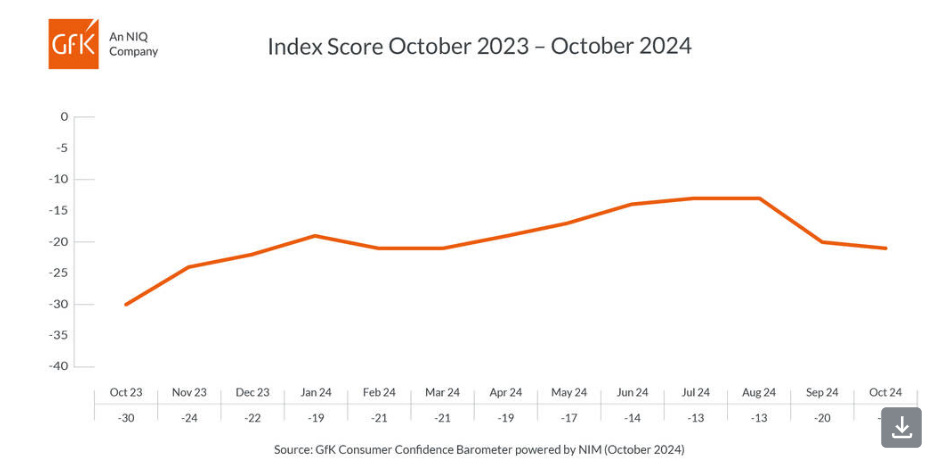Consumers ‘despondent’ ahead of tax-hiking autumn Budget

Looming tax hikes in the Budget have put consumers in a “despondent mood”, according to a survey, even as households have seen rising real wages on the back of lower inflation.
Having been improving for most of the year, GfK’s overall consumer confidence index dropped slightly in October having fallen sharply in September.
This took the index to -21, its lowest point since March. Neil Bellamy, consumer insights director at GfK, placed the blame for the decrease squarely on the Budget.
“As the Budget statement looms, consumers are in a despondent mood despite a fall in the headline rate of inflation,” he said.
“This month’s Consumer Confidence Barometer paints a picture of people holding their breath to see what’s in store for them on 30th October.”
Chancellor Rachel Reeves has repeatedly warned that she will take “difficult decisions” in next week’s Budget and is reportedly seeking to raise £40bn, weighted heavily towards tax hikes.

Reports indicate that she will target tax reliefs on pension contributions and might extend the freeze on tax thresholds by another year. Reeves will also likely hike capital gains tax as she seeks to clean up “the mess” which she claims to have inherited from the Conservatives.
The rumours of tax hikes damaged consumer perception of the economy, with households confidence in the health of the economy dropping slightly compared to September.
Still, the forward-looking personal finance index actually increased by one point in October, pointing to the recent positive news on inflation.
Inflation fell to 1.7 per cent in September, its lowest level since April 2021. On the back of lower inflation, markets expect the Bank of England to cut rates at least once more this year.
With wages rising faster than inflation, households are also seeing pay increase in real terms.
The major purchase index, which measures the likelihood that consumers will splash the cash on a larger product, also increased by two points.
GfK’s survey comes just a day after a similar report from PwC, which suggested the UK was suffering from a “vibecession“. This is when there is a disconnect between positive economic data and negative consumer sentiment.
Although many measures of consumer sentiment have worsened in recent weeks, retail sales actually increased in September.
“The link between consumer confidence and spending is not as strong as historically,” Linda Ellett, UK head of consumer, retail and leisure for KPMG, said.